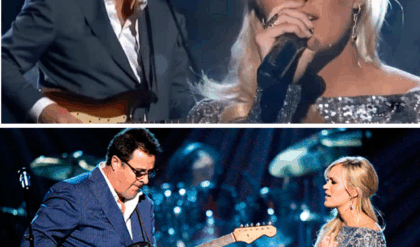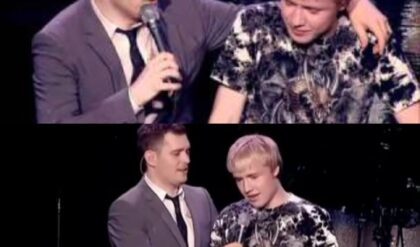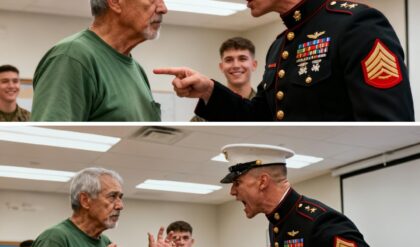In the electrifying world of prime-time talent competitions, where dreams collide with spotlights and raw talent meets unyielding ambition, few moments hit as hard as Aaron Nichols’ Blind Audition on The Voice this past Tuesday night. As the final notes of Chris Stapleton’s haunting “Cold” faded into the studio’s charged silence, the air seemed to crackle with possibility. Aaron, a towering figure from the sun-baked streets of Bakersfield, California, now calling Nashville home, had just delivered a performance so visceral, so steeped in soul and grit, that it didn’t just turn chairs—it spun the entire narrative of Season 28 on its axis. Coach Reba McEntire slammed her button first, her eyes lighting up like she’d just unearthed a long-lost family heirloom. Michael Bublé followed suit, declaring on the spot that this was the voice destined to crown McEntire the season’s champion. Snoop Dogg jumped in last, sealing a three-chair frenzy that left viewers—and quite possibly the other coaches—breathless.
But Aaron Nichols isn’t just another contestant stepping into the arena. He’s a man woven into the very fabric of The Voice‘s legacy, a guy whose life has brushed against the show’s glittering orbit in ways that feel almost predestined. From his early days strumming guitars in the shadow of hardship to his current role as a Nashville mainstay with music already carving paths in the industry, Aaron’s story is a masterclass in resilience, rhythm, and reinvention. And now, with his gravelly timbre echoing through living rooms across America, the question on every fan’s lips is: Could this be the breakout that catapults him from gigging troubadour to household name? Buckle up, because Aaron’s journey isn’t just inspiring—it’s a full-throttle ride through the heart of country music’s beating pulse, and it’s only getting started.
Let’s rewind the tape, not to Tuesday’s triumph, but to the dusty corners of Bakersfield where it all began. Born and raised in a neighborhood where dreams often came laced with struggle, Aaron grew up in a home that hummed with quiet determination. His mother, a beacon of unyielding grit, juggled 12-hour shifts at the hospital with housecleaning gigs just to scrape together the funds for his first guitar lessons. Picture this: a young boy, maybe eight or nine, fingers fumbling over steel strings in a cramped living room, while outside the world spun tales of oil rigs, tumbleweeds, and the faint promise of something bigger. Bakersfield, the self-proclaimed Country Music Capital of the West, isn’t forgiving—it’s the birthplace of legends like Merle Haggard and Buck Owens, but it’s also a grind that chews up aspirations and spits out survivors. Aaron’s mom knew that music could be his escape hatch, his ticket out of the cycle. “She sacrificed everything,” Aaron shared in a pre-audition confessional that tugged at heartstrings nationwide. “Those lessons weren’t just notes on a fretboard; they were her way of saying, ‘Son, this world’s tough, but you’ve got a voice that can shake it.'”
By his teens, Aaron was no longer just playing—he was performing. Local open mics became his proving ground, where he’d channel the raw ache of his surroundings into covers of Waylon Jennings and George Jones. But life, as it often does, threw curveballs. A stint in construction to pay bills, a move that tested his resolve, and the relentless pull of family responsibilities. Then came the pivot point: fatherhood. When his son entered the picture, Aaron looked at that tiny face and saw not just legacy, but urgency. “I want him to grow up knowing Dad chased the fire inside him,” he told producers, his voice steady but eyes alight with that fierce paternal fire. It was around this time, in 2022, that he packed up his life and headed east to Nashville—the mecca where songwriters bleed ink and pickers trade licks under neon signs. The City of Music didn’t roll out the red carpet; it handed him a gig sheet. Four to five nights a week, Aaron hit the stages of dive bars, wedding halls, and church pulpits, leading worship with the same intensity he brought to honky-tonk anthems. His sound? A potent brew of traditional country twang laced with modern edge—think Stapleton’s brooding depth meets Sturgill Simpson’s outlaw spirit.
What sets Aaron apart, though, isn’t just his backstory; it’s the connections he’s forged along the way—threads that tie him inexorably to The Voice‘s storied history. This isn’t hyperbole; Aaron’s orbit has grazed the show’s universe before he even stepped onto its stage. Whispers from Nashville insiders point to early brushes: a workshop session years back where he shared a bill with alumni like Cassadee Pope, the Season 3 champ whose pop-country flair lit up the charts. Or the time he sat in on a writers’ round at the Bluebird Cafe, that hallowed ground where The Voice hopefuls like Danielle Bradbery honed their craft. But dig deeper, and the links get personal. Aaron’s worship-leading gigs have overlapped with session work for producers who’ve helmed tracks for show veterans—names like Mark Hall, whose ties to Casting Crowns echo the faith-infused journeys of past contestants like Javier Colon, Season 1’s soulful victor. And let’s not overlook the California connection: Snoop Dogg’s late turn during the audition wasn’t mere strategy; Aaron’s Bakersfield roots vibe with the Doggfather’s Long Beach swagger, a shared West Coast underdog ethos that had social media buzzing about potential cross-coach drama.
Then there’s the music that’s already out there, simmering in the Nashville ether, waiting for this Voice spotlight to ignite it. Aaron isn’t a blank slate; he’s got a catalog that’s been quietly building steam. His debut EP, Dust and Dreams (released independently in late 2023), clocks in at five tracks of pure, unfiltered country catharsis. The standout, “Highway Hymns,” a brooding ballad about chasing redemption on endless blacktop, has racked up over 50,000 streams on Spotify alone, thanks to playlist curators spotting its Stapleton-esque growl. Listeners rave about the production—sparse acoustic layers giving way to swelling pedal steel that mirrors Aaron’s vocal dynamics, from whisper-soft verses to belt-it-out choruses that could shatter whiskey glasses. Critics on platforms like Holler have called it “the sound of a man who’s lived the lyrics,” praising how Aaron weaves personal vignettes—lost loves, late-night regrets, the pull of family—into hooks that stick like burrs on blue jeans.
But Dust and Dreams is just the appetizer. Aaron’s got unreleased gems in the vault, including a collaboration with rising songwriter Hillary Lindsey (credits include Carrie Underwood’s “Jesus, Take the Wheel”) on “Midnight Mercy,” a track that blends gospel undertones with outlaw country bite. Word from industry scouts is that labels are circling post-audition, eyes on his Voice trajectory. And don’t sleep on his live prowess: Videos from recent Nashville gigs show crowds swaying to originals like “Rusted Halo,” a gritty ode to blue-collar faith that’s already a staple in his sets. With music out and gaining traction, Aaron arrives on The Voice not as a wide-eyed newbie, but as a contender with skin in the game. His performance Tuesday wasn’t a fluke; it was the culmination of years honing that voice in smoke-filled rooms, where applause was earned, not given.
Now, let’s dissect that Tuesday night magic—the moment that had America hitting record and Twitter ablaze. The studio lights dimmed, the coaches settled into their swivel thrones: Reba, resplendent in sequins and Southern charm; Bublé, all charisma and crooner cool; Niall Horan, channeling One Direction’s cheeky edge into coaching wisdom; and Snoop, the laid-back legend whose turns are as unpredictable as a West Coast wave. Aaron strides out, guitar slung low like an old friend, his bearded frame exuding quiet confidence. The intro package rolls: clips of Bakersfield sunsets, his mom’s proud smile, sonogram scans of gigs turning into family lore. It’s textbook Voice storytelling—heart-tugging without tipping into sap—and it primes the pump perfectly.
He launches into “Cold,” Stapleton’s 2015 gem from Traveller, a song that’s all ice-veined regret and whiskey-warm redemption. Aaron’s fingers dance over the strings, not flashy but deliberate, each chord a deliberate exhale. Then comes the voice: low and loamy, like gravel churned under truck tires, building from a rumble to a roar. “You’re as cold as ice…” he drawls, and Reba’s chair whips around mid-phrase, her face splitting into a grin that screams “mine.” The camera catches her thumbs-up, a rare mid-song affirmation that sends producers scrambling for reaction shots. Bublé hesitates, savoring, then spins with a flourish: “Man, that voice, that gravel, that grittiness—Reba’s gonna win with this dude!” It’s bold, almost sacrificial, but the twinkle in his eye says he means it. Snoop, ever the vibe curator, hits last, just as Aaron hits the bridge, his “soul for days” (Niall’s words) twisting the melody into something primal.
The post-turn pitch-fest? Pure gold. Reba leans in, her Oklahoma twang wrapping around compliments like a warm blanket: “Darlin’, that was homecoming. Your tone penetrates the soul—I’ve been waiting for a voice like yours.” She shares a story of her own early struggles, drawing parallels to Aaron’s mom-fueled hustle, forging an instant mentor-artist bond. Bublé doubles down on his prediction, pitching his pop-jazz polish as the secret sauce to elevate Aaron’s country core: “I’ve got the charts in my back pocket—let’s make you undeniable.” Snoop, playing the everyman card, bonds over Cali roots: “From the Valley to the Beach, we grind the same. Join me, and we’ll flip the script on country.” Niall, though unturned, chimes in from the sidelines: “There’s depth there that could carry you all the way.”
Aaron’s choice? Team Reba, no hesitation. “My wife would never let me hear the end of it,” he quips, but the truth runs deeper—it’s alignment of spirits, a recognition that McEntire’s decades of trailblazing mirror his own hard-won path. As he joins her full roster, the final spot sealed, the studio erupts. Viewers at home? They erupted too. Social media lit up like a Fourth of July bonfire: #TeamReba trended within minutes, with fans dissecting every growl, every glance. “Aaron Nichols just made me believe in second chances,” one tweet read, racking up thousands of likes. Another: “That voice is therapy in audio form—Bublé’s right, he’s the one.” Clips from the audition went viral, amassing millions of views on YouTube and TikTok, where users stitched their own “Cold” covers in homage.
What made it so outstanding? Let’s break it down technically, because Aaron’s performance wasn’t just felt—it was masterfully constructed. Vocally, his timbre is a revelation: a baritone growl that evokes Stapleton but carves its own lane, with micro-vibrato on sustained notes that adds emotional shudder without overkill. He paced the dynamics impeccably—starting intimate, building to a controlled belt on “You’re as cold, cold, cold as ice”—never forcing, always flowing. Guitar-wise, his acoustic accompaniment was symbiotic, not showy; simple open chords let the voice lead, a nod to his worship roots where subtlety serves the song. Emotionally? It poured out authentic. You could see the Bakersfield boy in his eyes, the Nashville hustler in his stance—vulnerability weaponized into power. In a season already stacked with vocal fireworks, Aaron’s audition stands as a slow-burn masterpiece, the kind that lingers long after the credits roll.
Zoom out, and this moment slots into The Voice‘s grand tradition of country contenders who redefine the genre. Think Blake Shelton’s early teams, brimming with twangy firepower, or the crossovers like Kelly Clarkson’s powerhouse ballads. Aaron echoes them all but adds layers: his faith-infused authenticity recalls Chris Stapleton’s own Voice-adjacent rise (Stapleton guested on the show in 2016), while his family-man ethos channels the relatable heroism of winners like Jordan Smith. Season 28’s coaches—Reba’s country royalty, Bublé’s crossover appeal, Niall’s pop sensibility, Snoop’s genre-bending cool—create a perfect storm for Aaron. Team Reba, now complete with firebrands like Aubrey Nicole (whose “Burning House” brought the Queen to tears), positions him as the anchor, the gravelly glue holding a squad of dreamers together.
As the Battles loom, speculation runs wild. Who will Reba pair him against? A vocal showdown with Peyton Kyle’s soulful Bruno Mars flip? Or a stylistic clash with Conrad Khalil’s R&B edge? Aaron’s versatility—honed across weddings, churches, and bars—suggests he’ll adapt like a chameleon, turning duets into dialogues that showcase his range. And off-stage? His music’s momentum builds. Post-audition streams for “Highway Hymns” spiked 300%, per Spotify analytics, with fans hunting down his EP like buried treasure. Labels whisper about development deals, and Nashville’s grapevine hums with collab invites. Aaron’s not just competing for a title; he’s auditioning for immortality in an industry that chews up nine out of ten.
Yet, for all the hype, Aaron remains grounded, his post-audition interviews laced with gratitude. “This show’s given so much to so many,” he told NBC Insider, name-dropping influences like Voice alums who’ve mentored him informally over beers. “I’m here for my son, my wife, my mom—but also for every kid in a tough spot who picks up a guitar and thinks, ‘Maybe.'” It’s that humility, paired with his undeniable talent, that makes him magnetic. In a landscape of polished performers, Aaron’s the real deal: scarred, soulful, and swinging for the fences.
As The Voice hurtles toward its next phase, Aaron Nichols isn’t just a standout—he’s the spark. Tuesday night’s triumph was no anomaly; it was the overture to a symphony. With connections that run deep, music that’s ready to roar, and a voice that could melt steel, he’s poised to not just survive the battles, but to conquer them. America, get your voting fingers ready. Aaron’s story isn’t ending—it’s just hitting its stride. And if Bublé’s prophecy holds, by season’s end, we’ll all be toasting to the new king of country cool.





